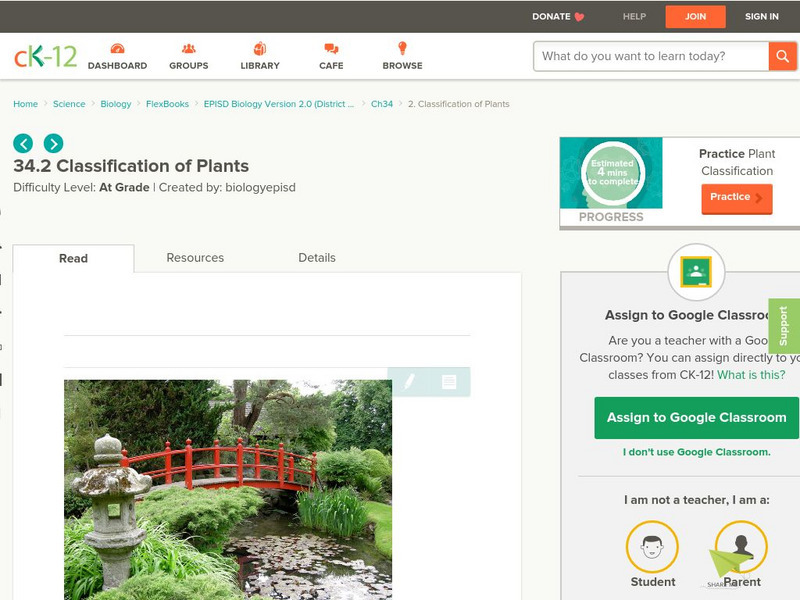Hi, what do you want to do?
Scholastic
Study Jams! Mosses and Ferns
Mosses and ferns are some of the world's oldest types of plants. Here is a quality 10-slide presentation set to gentle background music for beginning botanists to view and enjoy. Accompanying captions explain that these are both...
Scholastic
Study Jams! Gymnosperms: Seeds in Cones
Two very hip teenagers walk through the forest collecting evergreen cones. One teaches the other about gymnosperms: cycads, ginkoes, gnetophytes, and conifers. He tries to convince his friend how amazing cones are, while she defends...
Biology Junction
Seeds and Fruits: Types and Dispersal
Did you know that some seeds rely on elephant dung for dispersal? Pupils use class discussion and direct instruction based around a presentation to learn about seed types and dispersal methods. Slides vary from presenting content to...
Biology Junction
Plant Diversity
Ginkgo trees existed for more than 350 million years, and, at this time, only one species still remains. While plant diversity generally increases over geologic time, some interesting exceptions occur. Young scientists learn about plant...
New South Wales Department of Education
Plant Groups
Bryophytes can grow in temperatures just above zero degrees. This 17th installment in a series of 20 introduces learners to the five groups of plants: algae, bryophytes, pteridophytes, gymnosperms, and angiosperms. Classes then explore...
Curated OER
AP: Chapter 29 and 30: Plant Diversity
It's a jungle out there! That is because of the tremendous diversity among plants. In this AP biology assignment, botanists answer questions about plant evolution, diversity, and reproduction. They differentiate between monocots and...
Curated OER
Plant Diversity
Here is an all-encompassing overview of the plant kingdom! For this worksheet, beginning botanists describe characteristics of the four different plant phyla, explain various life cycles, differentiate between monocots and dicots, and...
Curated OER
Biology Jeopardy
Play Jeopardy as you review what might possibly be an entire year's high school biology course! The vast variety of questions requires that you read through the slides to make sure that they all relate to your curriculum. You could make...
Curated OER
Introduction to Plants
A vast overview of avascular and vascular plants, this PowerPoint displays all of the notes your botanists need to take. It lists primitive plant groups and their characteristics. It separates gymnosperms and angiosperms, also detailing...
Curated OER
Kingdom Plantae
There are some great diagrams and labels on these slides that support the topic of plants. The definition of kingdoms, and summaries of the vascular systems and gamete production are given. This would be a perfect choice to kick off a...
Biology Junction
Seed Plants: Gymnosperms and Angiosperms
One of the reasons plants found success on land relates to seed development. Scholars learn about many different forms of seeds and how they changed over time. It describes the structure and function of many different types of seeds in...
Curated OER
Mapping Gymnosperms and Angiosperms
In this plant worksheet, students create a map of a familiar area such as their yard, a nearby park, or the school grounds showing the major plants. On their map they identify the plants in three ways following the example provided. ...
Curated OER
Seed Plant Reinforcement
In this plant activity, students contrast gymnosperms and angiosperms by completing a table and using information from their textbook. They also identify 5 plants as either monocot or dicot and complete 3 short answer questions about...
Curated OER
Feed Me, Seymour
Students work in small groups to create posters illustrating the major facts and functions of plant organs. Within their groups, they assume the role of specialists creating specialized posters pertaining to the different parts of plants.
Curated OER
Seed Plants: Gymnosperms
Middle schoolers identify what makes up a seed. For this gymnosperms lesson students identify conifers and explain how they reproduce and what the importance of gymnosperms are.
Curated OER
How Do Plants Reproduce?
In this plant reproduction worksheet, students will complete a Venn diagram by comparing and contrasting gymnosperms and angiosperms.
Curated OER
Seedless Vascular Plants
In this fern and gymnosperm learning exercise, students will study a diagram of the life cycle of a lycophyte and then correctly order four life cycle statements. Then students will complete two true or false statements about...
Curated OER
Monocots vs. Dicots
Students examine the differences in nonvascular and vascular plants. They compare the differences between gymnosperm and angiosperms. Students compare the differences between moocots and dicots. They view a powerpoint presentation on...
Curated OER
Fun with Phylogenetic Trees
Tenth graders differentiate angiosperms and gymnosperms. In this biology lesson plan, 10th graders construct a musical phylogenetic tree from information they gathered on resource websites. They present their project in class.
Curated OER
Fungi and Plants
In this biology worksheet, students identify and locate various vocabulary terms pertaining to fungi and plants. There are 31 biology terms located in the word search.
Encyclopedia of Earth
Encyclopedia of Earth: Species: Gymnosperm
Article explaining what a gymnosperm is, and its origin in the Carboniferous Period. It covers taxonomy, distribution, and types of gymnosperms and how they reproduce. (Published: March 24, 2010)
CK-12 Foundation
Ck 12: Episd: Classification of Plants
[Free Registration/Login may be required to access all resource tools.] Identify and understand the system used to classify plants and the difference between vascular and nonvascular plants.
Georgia Department of Education
Ga Virtual Learning: Earth and Life History
In this amazingly comprehensive tutorial you will learn about the geological and environmental changes that occurred during the geologic time scale.
Biology 4 kids
Biology4 Kids: Quiz: Plants
Take this ten-question review quiz over the Plant Kingdom. Read more about each question after an incorrect answer is given.


























